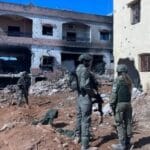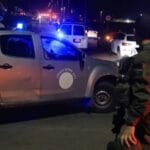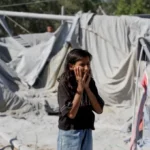“This is the most dangerous of all front lines,” says Oleksandr, the head of a medical unit for the Ukrainian army’s 25th Brigade.
We are in the treatment room of a cramped makeshift field unit – the first point of treatment for injured soldiers.
“The Russian Federation is pushing very hard. We have not been able to stabilise the front. Each time the front line moves, we also move.”
We are close to Pokrovsk, a small mining city about 60km (37 miles) to the north-west of the regional capital, Donetsk.
The medics tell us they recently treated 50 soldiers in one day – numbers rarely seen before during the course of this war. The casualties are brought in for treatment at this secret location after dusk, when there is less of a chance of being attacked by armed Russian drones.
The Ukrainian troops have been injured in the ferocious battle to defend Pokrovsk. Just months ago, this was considered a relatively safe place – home to about 60,000 people, its streets lined with restaurants, cafes and markets. Soldiers would often come from the front line to the city for a break.
Now, it feels like a ghost town. More than three-quarters of its population have left.
Since Russia captured the city of Avdiivka in February, the speed of its advance in the Donestk region has been swift. At the start of October, it captured the key city of Vuhledar.
The Ukrainian government agrees with the soldiers we meet on the ground, that fighting around Pokrovsk is the most intense.
“The Pokrovsk direction leads the number of enemy attacks,” Kyiv stated this week – claiming that, in total, the Armed Forces of Ukraine had repelled about 150 “enemy” attacks on most days in the past two weeks.
In the field unit, six miles from the front, army medic Tania holds the arm of Serhii, a soldier with a bloodied bandage covering most of his face, and guides him into an examination room.
“His condition is serious,” says Tania.
Serhii has shrapnel injuries to one of his eyes, his skull and brain. The doctors quickly clean up his wounds and inject antibiotics.
Five more soldiers arrive soon after – they are uncertain how they received their injuries. The barrage of fire can be so fierce and sudden, their wounds could have been caused by mortars or explosives dropped from drones.
“It’s dangerous here. It is difficult, mentally and physically. We are all tired, but we are coping,” says Yuriy, the commander of all the brigade’s medical units.
All the soldiers we see were injured at different times of the morning, but they have only arrived after nightfall, when it is safer.
Such delays can increase the risk of death and disability, we are told.
Another soldier, Taras, has tied a tourniquet around his arm to stop the bleeding from a shrapnel wound, but now – more than 10 hours later – his arm looks swollen and pale and he can’t feel it. A doctor tells us it might have to be amputated.


















